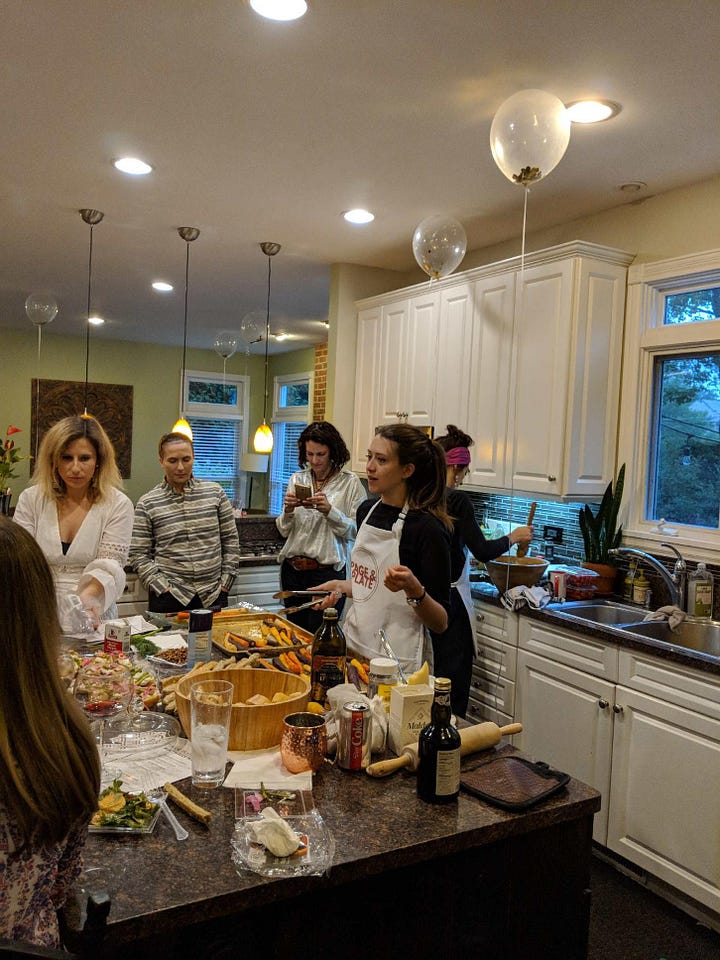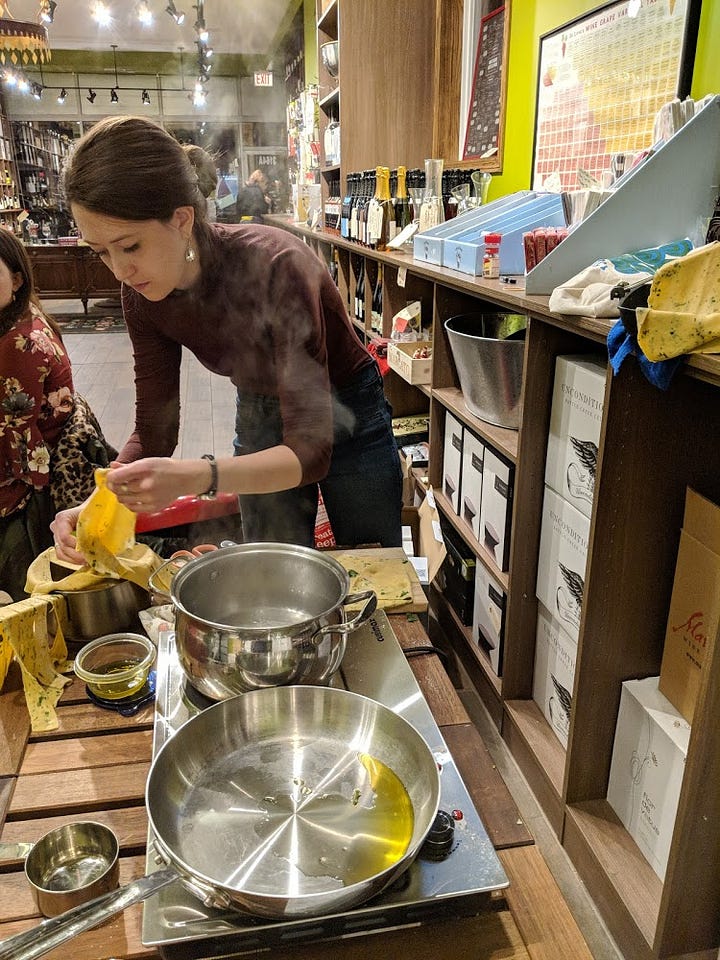On "Taste and Adjust"
That infamous recipe instruction and what it means about recipe writing as a whole.
I have a theory. The way we’ve come to write recipes—and I mean almost everyone, from New York Times Cooking contributors to food bloggers—isn’t doing anyone much good. We think we’re teaching people how to cook, but really, we’re creating a library of recipes that coddle readers through instructions without ever really needing to think critically about what’s going on. *record scratch* Welcome to my spicy take of the week!
Recipes are funny things. Often, writers come straight out and say that they’re on a mission to get you to host more dinner parties or to become a Dessert Person or try your hand at a new cuisine—all through learning how to cook. Yet the way that food media has standardized recipe writing robs home cooks of the opportunity to learn to improvise and cook intuitively. It creates a community of home cooks who claim that they can’t cook. All they can do is follow the recipe.
It makes me sad to meet home cooks who believe this, mostly because I think they’re gaslighting themselves. After all, most of them have been cooking, at some level, for themselves for a significant portion of their lives. They already enjoy it! They know the basics in the kitchen and what they like. And yet, if I were to give them one of my recipes that is not yet fit for internet consumption (i.e. filled with robot voice and SEO-isms), they would falter, not for an inability to cook the recipe themselves without detailed guidance, but for a lack of confidence in their ability to do just that. Recipes are written to get you to replicate a dish rather than learn to cook with your gut, and that’s exactly why you think you can’t.
I write recipes on a regular basis, for this very Substack, for clients, for friends and family, and for a project that I hope to one day might become a cookbook itself. I often pause as I’m writing the instructions, trying to decide between being my pedantic recipe writer alter ego or my true form, which is authentic, sometimes crass, and very often guessing at things in the kitchen.


Back when I taught classes, I had it down to a science: I told attendees that I had never been to culinary school, worked in the line of a restaurant, or taken any sort of professional certification or course to be able to teach people how to cook. The thing that set me apart from them—and only some of them!—was that I had the audacity to try things in the kitchen and the humility to shrug and make my mistake into something else when it went wrong. (In the interest of full disclosure, I *do* need to highlight here that the humility I speak of exists only when I am cooking for myself on a whim and not when I am cooking for company, in which case I will turn into a raging monster if the slightest thing goes wrong. I’m fun!)
Because I was forced to think on my feet when teaching these classes, I felt like I was actually teaching the attendees to think on their feet with me. I loved it! And I loved being able to take that ethos into my recipe writing for the foods I cooked in class that I started recording on my blog. When I read the archived recipe posts from my page before I technically knew what I was doing, I recognize the woman behind the words, and I can hear myself telling a friend how to recreate a recipe in their kitchen in real life. When I look at recipes from after I learned about how to really write recipes, I can barely pick them out of a line up of the other 65 million recipes for a chocolate chip cookie and wonder what that recipe actually added to readers’ lives.
Somehow, I think that the magic of a recipe gets stripped from it when you’re making it universal enough to be cooked by anyone. There’s a time and a place for step-by-step, beat-by-beat recipes, and those recipes are important for getting people into the kitchen and cooking. But writers and developers should know and write to their audiences: do they still need to be told to add ingredients to a bowl? Or should writers assume that after cooking enough dinners, a reader will instinctively know not to dump the ingredients for the pasta salad onto the counter? The powerhouse writers behind Everything Cookbooks podcast discussed this at length in this episode, and I’d encourage you to give it a listen, cookbook writer or not. Dianne Jacobs also has fantastic resources on this subject, including a post on the very same topic, which you can read here.
It’s fascinating to think about how to instruct people to do anything—assuming a basis of knowledge can be a dangerous thing, and I have personally been told to imagine that the reader knows nothing when writing about how to cook. The more recipes I write, the more that grates on me. I have faith in you people! I believe in you, even if you don’t yet!
“Taste and adjust” is a standard instruction for recipes, and the last hope that recipe writers have to instill in their readers an ounce of confidence in what they’re doing in the kitchen. I catch myself writing this sometimes, when really what I mean to say instead is: do you like things salty? Or do you prefer the bite of black pepper to finish your dish? Do you think I added too much sugar? Go back and take some out. “Taste and adjust” should really be “make it your own.”
What if we wrote recipes like this all of the time? Sure, there would be a learning curve. But I think for a certain recipe reader and home cook, that learning curve would empower them to take on new adventures in the kitchen, and I’d be excited to see where that would take them. What do you think? I’m curious to hear your thoughts on this!
Coming next week: a piece on food as nostalgia, including a free recipe. Paid subscribers will get a recipe for blueberry citrus cake on Friday, and it’s a good one. Thanks as always for being here and reading these words. I appreciate you!





Hey Laura- just getting back to this after your last Substack post referenced it. I really, really feel this. The way my mom cooks is totally by feel and I think I've gotten better at this also after ten years of cooking a LOT for myself. I've come to really enjoy the simple challenge when a recipe I'm following doesn't really outline all the steps and forces me to think a bit and take a risk and rely on my actual intuition. I'm always happy to find (after the initial stress and nervousness abates) that I do have a sense for how things should taste and know my way around the kitchen :)